2024 NFL Draft: Best available players for Day 2
They didn't hear their names called Thursday night in Round 1 of the NFL Draft. For some, it was a disappointing surprise. For others, Friday evening's Rounds 2 and 3 is where they expected to land.
Here's a look at the best available players, grouped by position, based off of Nate Tice's Top 100 big board of draft prospects and analysis:
Quarterback
Spencer Rattler, South Carolina
A team with an established starter and a good offensive coach looking for a dart throw to find a replacement in the mid-future (say, the Rams) could be a good fit.
Wide receivers
Adonai Mitchell, Texas
In the red zone Mitchell is so dangerous when paired with his ability to pick up speed and jump out of the gym (11-4 broad jump and a 4.34 40-yard dash at the combine).
Keon Coleman, Florida State
An outside wide receiver who may lack a few limbs on his route tree but makes up for it with his ability to finish alley-oops and adjust for throws all around his body.
Ladd McConkey, Georgia
He is another player with limitations to be a true No. 1, but McConkey has all the makings of a third-down target monster who can create explosive plays at the underneath and intermediate levels.
Ja’Lynn Polk, Washington
Polk might not have true No. 1 option upside, but he can carve out a role in a lot of different types of offenses as a No. 2 option and become a reliable target-eater no matter what’s asked of him.
Troy Franklin, Oregon
Franklin is a good route runner with long speed and will snatch throws from all angles that can help him in contested catch situations and in the red zone.
Jalen McMillan, Washington
McMillan won’t make a ton of defenders miss, but has some YAC ability as a defender splitter who can plant his foot and get upfield.
Roman Wilson, Michigan
Wilson has average size and might not be the best downfield threat, but he will be a nice secondary option in the intermediate and underneath areas.
Malachi Corley, Western Kentucky
Corley can create explosive plays with the ball in his hands and has good strength.
Johnny Wilson, Florida State
He can be frustrating, but I am bullish on Wilson’s 6-6 size and fluid athleticism, with flashes of feel for playing WR.
Running backs
Trey Benson, Florida State
Ideally he’d be with another back to eat some touches, but Benson has good vision, footwork and big-play ability, and shows off good hands in his limited exposure as a pass catcher.
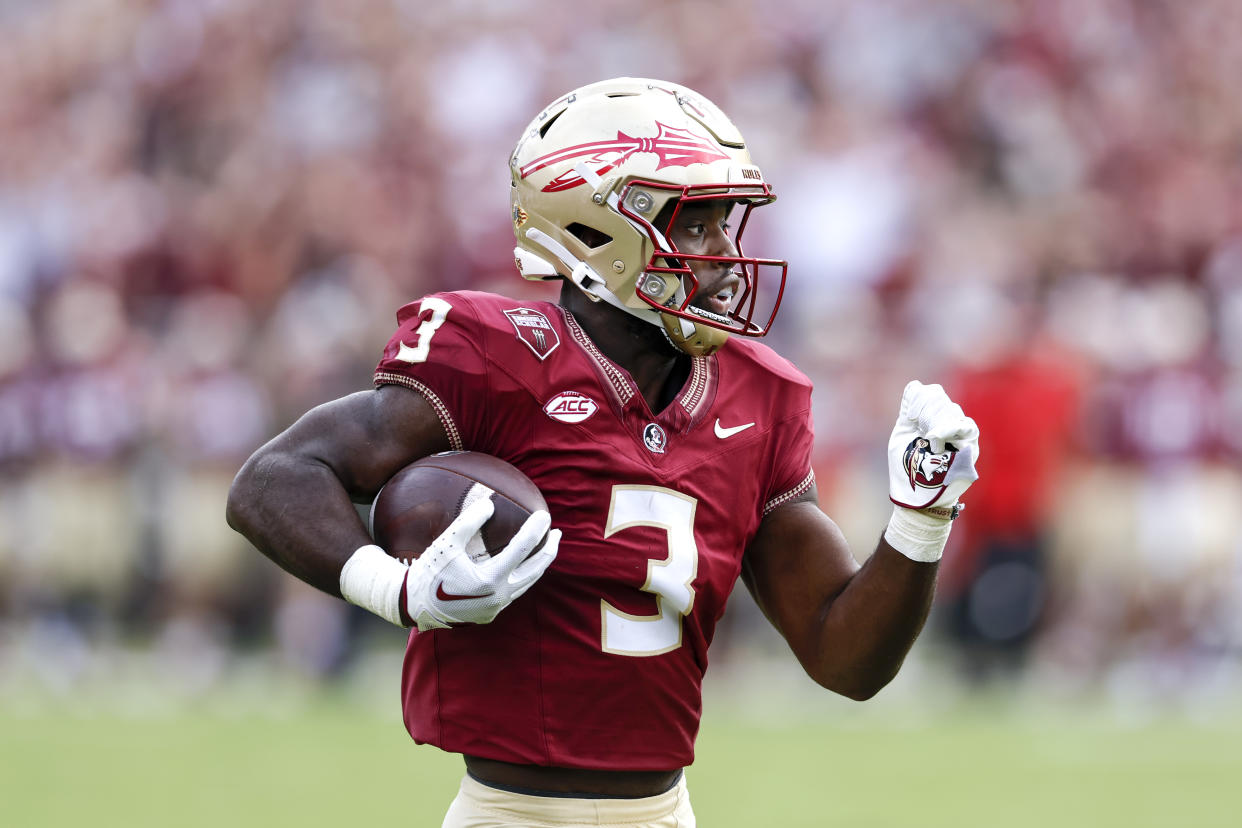
Audric Estime, Notre Dame
Estime is a bit of a finesse back in a bigger body, but still consistently runs through contact and shows off good feel and tempo for when to plant his foot and get north through the hole.
Jonathon Brooks, Texas
Brooks has adequate size and is coming off an ACL injury, but he is a smooth athlete with good vision, balance, hands and could be a strong part of a 1-2 punch at the next level.
Braelon Allen, Wisconsin
Allen does not have home run speed, but he's more than the Wisconsin stereotype of lumbering, oversized tailback.
Blake Corum, Michigan
Corum doesn’t have ideal height, but he has a stout build and is a strong runner between the tackles with tempo and vision that are best used in gap scheme runs.
Bucky Irving, Oregon
Irving is undersized and just an adequate athlete, but he knows how to set up his runs and keep hitting singles and doubles with his good vision and footwork.
MarShawn Lloyd, USC
Overall Lloyd looks like a solid three-down back who can contribute in different schemes.
Ray Davis, Kentucky
Davis is not explosive and is more of a singles hitter, which limits his upside, but he can be a nice member of a committee.
Offensive linemen
Kingsley Suamataia, OT, BYU
Suamataia’s play is inconsistent, his footwork can get out of whack and he can be all over the place with his hands but he is a good athlete who can move like a much smaller player with plenty of pop to his hands when he strikes defenders, and he just turned 21 in January.
Jackson Powers-Johnson, C/G, Oregon
The 2023 season was Powers-Johnson’s first full-time experience at center (he also has starting experience at guard and even defensive tackle), and while there are still moments of rawness, he's explosive and powerful and plays with an infectious style.
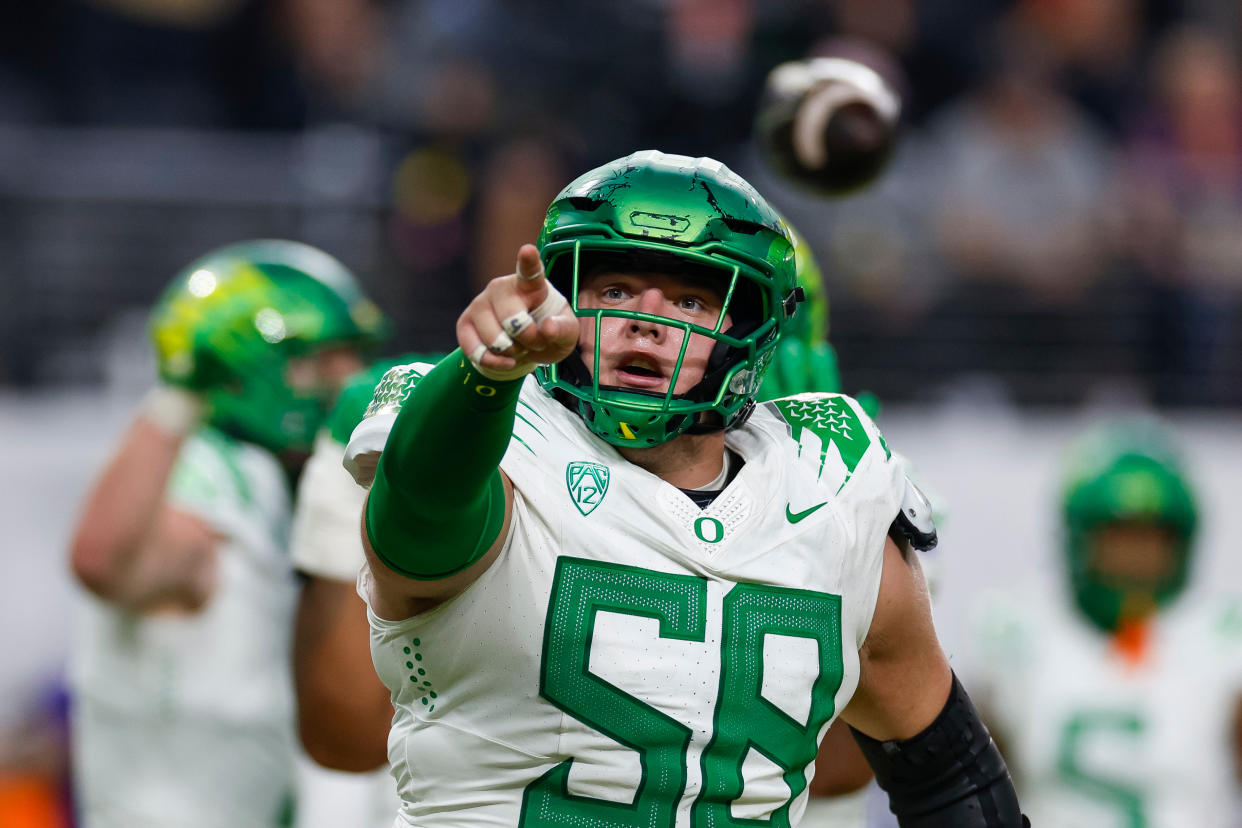
Christian Haynes, OG, Connecticut
Haynes’ movement in the run game, intelligence and ability to hold up against better athletes as a pass protector make him a classy guard prospect.
Patrick Paul, OT, Houston
Paul can wallop defenders when he has everything working in the right direction and has real strength to go along with his long arms, but he is going to need consistent coaching and a plan at the next level to focus his ability and reach his high ceiling.
Zach Frazier, C, West Virginia
Longer defenders will give Frazier issues at the next level, but Frazier’s high-energy, polished and tenacious style will make for an exhausting day for whoever goes across him on Sundays.
Cooper Beebe, OG/C, Kansas State
Beebe is a strong interior lineman who consistently stays square to his blocking assignment because of his awareness, athleticism and quickness.
Dominick Puni, OG, Kansas
Puni has good size, solid length and is a better run blocker than pass blocker because of his lack of overwhelming athleticism.
Kiran Amegadjie, OT, Yale
Amegadjie is a complete mystery box of a player coming from the Ivy League, yet it is easy to see why he is so intriguing when you see his excellent combination of size and athleticism.
Christian Mahogany, OG, Boston College
Mahogany is a run-first guard who can wipe out a defensive tackle but is average as a pass protector.
Sedrick Van Pran, C, Georgia
Van Pran is a solid center-only prospect whose experience can help him start on Day 1; he is feisty with good technique and size, but has limited athleticism and length.
Blake Fisher, OT, Notre Dame
Fisher, who improved in the 2023 season, has a great frame, plenty of athleticism and foot quickness to hang at offensive tackle.
Roger Rosengarten, OT, Washington
Rosengarten needs to get stronger to take on a starting role, but his size, solid length and athleticism give him a chance.
Isaiah Adams, OG, Illinois
Adams plays with strength and smarts that can bury defenders if he latches his hands into them.
Zak Zinter, OG, Michigan
Zinter is coming back from a late-season leg injury and has just average strength, but Zinter’s film isn’t littered with many bad plays and he knows how to accomplish his task.
Tight ends
Theo Johnson, Penn State
Johnson has legitimate upside as an in-line tight end, but he can actually stretch the field as a pass catcher with how smooth of an athlete he is in such a large frame.
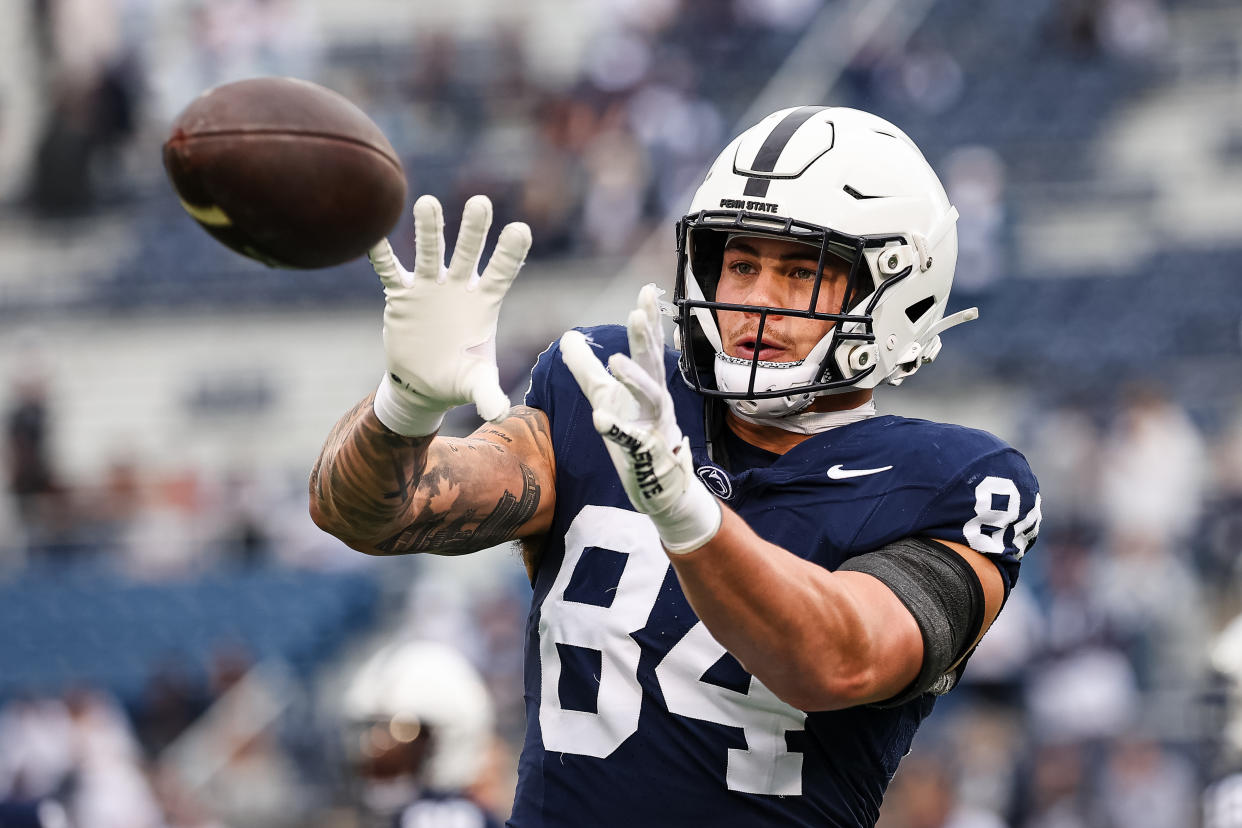
Ja’Tavion Sanders, Texas
Sanders is a receiving tight end who will have to be moved around the formation to maximize him.
AJ Barner, Michigan
Barner is a good blocker with good technique, strength and ability to bend and stay on his blocks through the whistle, while also being a solid athlete with good hands.
Jared Wiley, TCU
Wiley plays like an oversized wide receiver but is a capable blocker who can scrap in the run game.
Cade Stover, Ohio State
Stover moved around positions in college and is a bit of a wild horse of a player at tight end, often rumbling on his routes and with the football through defenders after the catch.
Ben Sinnott, Kansas State
Sinnott is more of an old H-back than traditional tight end, but he can be a good role player in the right situation because of his ability to contribute as a secondary pass catcher and blocker on the move.
Defensive linemen
Jer’Zhan Newton, DT, Illinois
Newton isn’t a bendy athlete and lacks the bulk to hold the point consistently against double-teams, but he can jolt linemen in singled-up situations and provide instant-win explosive plays when he times up the snap.
T’Vondre Sweat, DT, Texas
There aren’t many giant defensive tackles — 360-plus pounds — who can sideswipe interior linemen like Sweat did.
Michael Hall Jr., DT, Ohio State
It’s a bit of a risk because of his low snap count in college, but Hall has serious upside as a disruptive interior defender who can play every down.
Marshawn Kneeland, Edge, Western Michigan
Kneeland is built like a defensive end more than an outside linebacker, and plays with heavy hands and has a frame to grow into.
Brandon Dorlus, DL, Oregon
Dorlus is versatile and can move along the defensive front depending on the down and play call, which will intrigue certain defensive coaches.
Bralen Trice, Edge, Washington
Trice is a power-first defender who can consistently push the pocket and impact the run game.
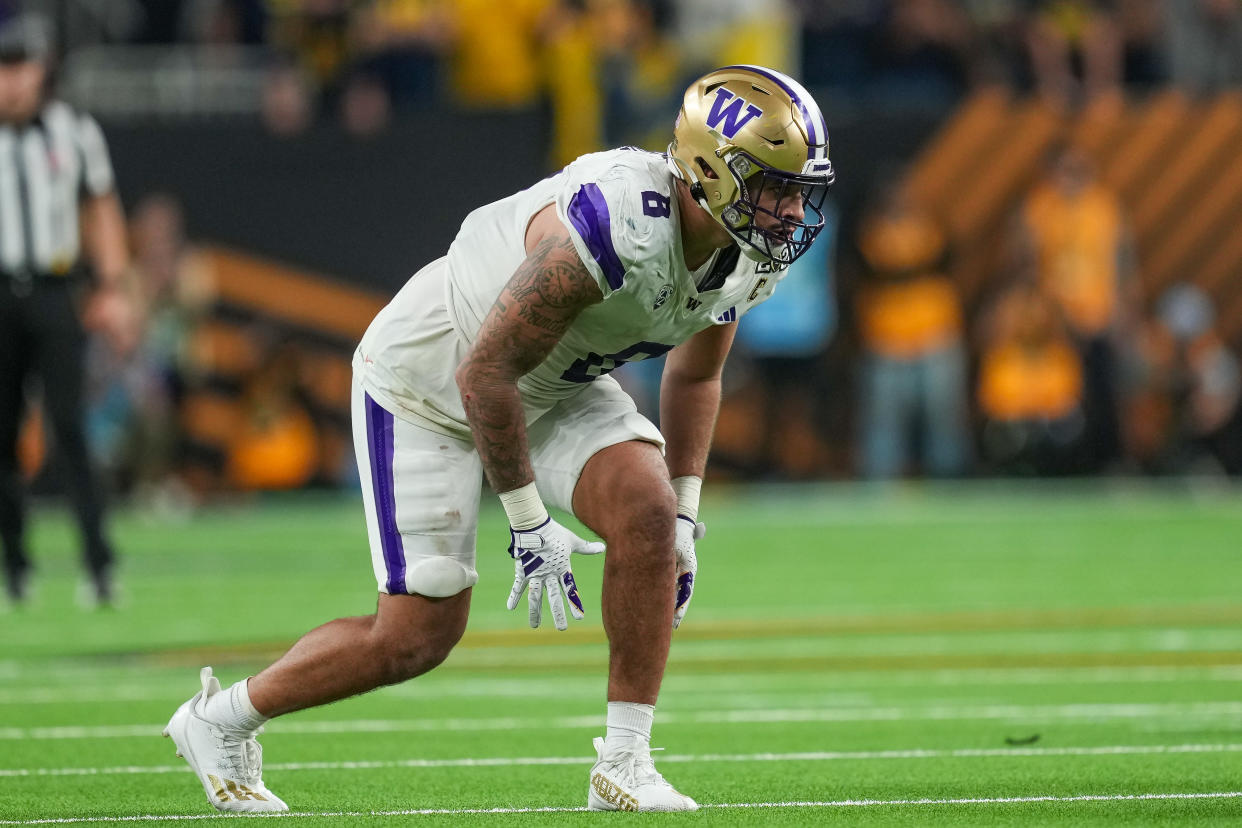
Chris Braswell, Edge, Alabama
Braswell wins with more effort than high-end athleticism.
Kris Jenkins Jr., Michigan
Jenkins’ game is more flashes than fully formed, but he has the upside of a three-down defensive tackle with potential to be a disruptive pass rusher from the inside.
Austin Booker, Edge, Kansas
Booker was productive in his one year at Kansas, and that was despite no real plan as a pass rusher and lack of consistency with his game, often being a non-factor for long stretches.
Ruke Orhorhoro, DT, Clemson
Orhorhoro has a ton of talent and flashed his amazing traits at times in college, but never consistently put it together or impacted games during his time at Clemson.
Maason Smith, DT, LSU
Smith is a gamble of a player but his combination of size (6-5, 306 pounds, 35-inch arms), short-area quickness and ability to impact all three downs are going to be intriguing for teams at the next level.
Braden Fiske, DT, Florida State
Fiske tested like a monster at the scouting combine and can create explosive plays, but his short arms give him little room for error or ability to recover, and will often put him in a bad position if he is unable to win right after the snap.
Adisa Isaac, Edge, Penn State
Isaac will often take himself out of a play because of his lack of a plan and hands ending up all over the place, yet Isaac shows the ability to be a strong run defender and plenty to work with as a pass rusher.
Jonah Elliss, Edge, Utah
Elliss is a non-factor when defending the run because of his size (6-2, 243 pounds) and will likely start his career as a designated pass rusher-type, but with room to grow into a more every-down player.
Linebackers
Junior Colson, Michigan
Colson is a smart player and an OK athlete, but can hold up in coverage because of his play recognition ability.
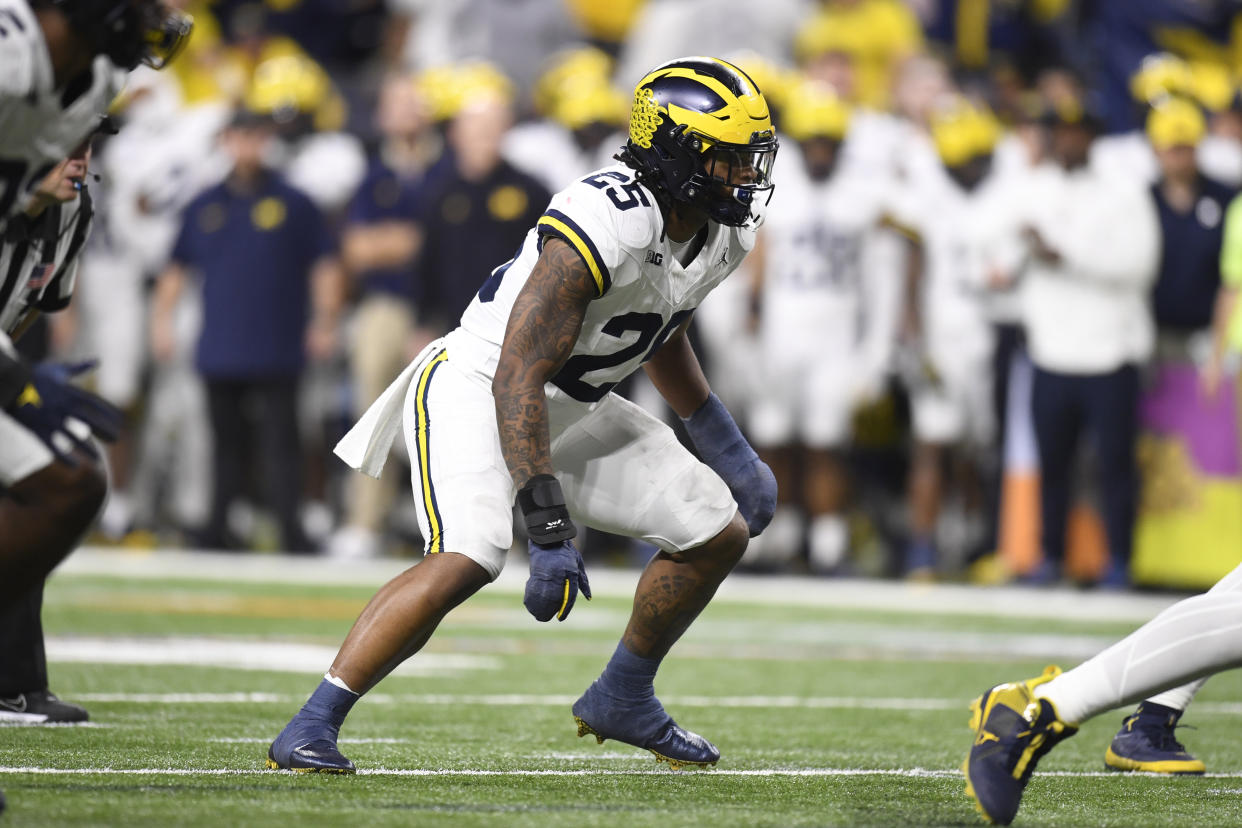
Edgerrin Cooper, Texas A&M
Cooper has real length (34-inch arm length) and speed, but lacks ideal size (only 230 pounds) and his play recognition can be up and down.
Cedric Gray, North Carolina
Gray is a run-and-hit type of linebacker, but in a weak class, he provides as good of a package as any in terms of size, length, athleticism and tackling ability.
Tommy Eichenberg, Ohio State
Eichenberg was not a net negative in coverage, although he can be overmatched against top-tier receiving tight ends and running backs.
Payton Wilson, North Carolina State
Wilson, a straight-line athlete who has battled injuries in his college career, plays with outstanding effort and will make some fun plays chasing down ball carriers with his speed.
Defensive backs
Cooper DeJean, CB/DB, Iowa
A top-shelf athlete who has Pro Bowl potential at outside cornerback, slot, safety or punt returner, DeJean is competitive, a strong tackler and loves to press receivers when working on the outside, with clean hands to avoid penalties and the coordination and speed to stay in lockstep.
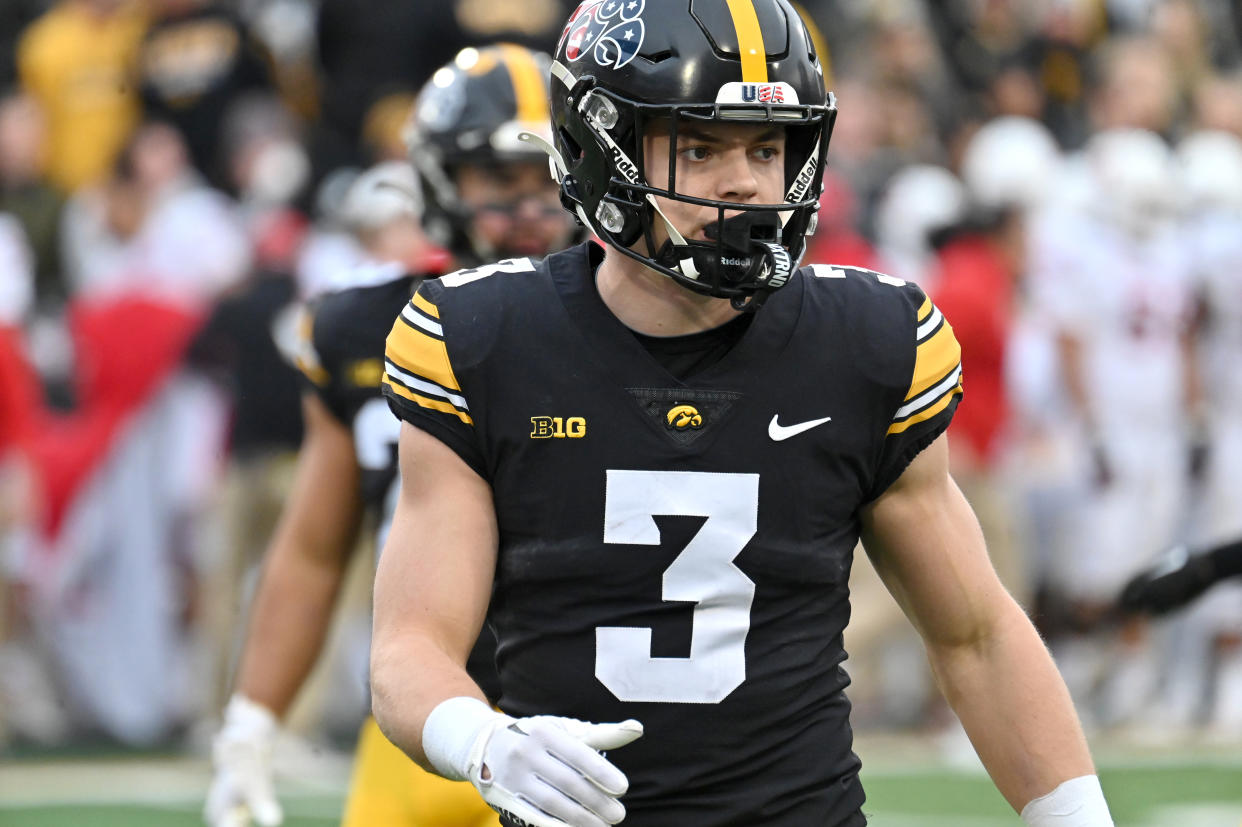
Kool-Aid McKinstry, CB, Alabama
McKinstry is a crafty cornerback, one who wins with control and understanding of the position and using his length and intelligence.
Kamari Lassiter, CB, Georgia
Lassiter isn’t a great athlete and lacks ideal size, but he is a competitive and smart player who sees the game well and is constantly in the right position.
Ennis Rakestraw Jr., CB, Missouri
Rakestraw’s ability to hold his own against different types of wide receivers, with potential to play snaps in the slot, gives Rakestraw a path as a starter.
Malik Mustapha, S, Wake Forest
Mustapha is this year’s best tackling defensive back prospect.
Tyler Nubin, S, Minnesota
Nubin is a good athlete who can play in the box or from depth; he will be best in a quarters-based system with another like-bodied safety.
T.J. Tampa, CB, Iowa State
Tampa can match up with bigger receivers and also is a smart player when in zone coverages.
Cole Bishop, S, Utah
Bishop is versatile with two-way upside at safety, being able to play in coverage or fill the run with equal aplomb and doing so with long strides.
Calen Bullock, S, USC
Bullock has good size and tight footwork, and is a better overall coverage player.
Javon Bullard, S, Georgia
Bullard has a clear path to start at the next level because of his coverage ability and intelligence.
Mike Sainristil, CB, Michigan
Sainristil has below-average size but is a good athlete and smart player who could provide depth and be a possible starter at all five defensive backfield positions and also on special teams.
Max Melton, CB, Rutgers
Melton is a supreme athlete with solid size who is best right now playing in off coverage.
Kamren Kinchens, S, Miami
Kinchens is aggressive, productive and always on the hunts for big plays, but his below-average athleticism will often give him little chance to recover.


